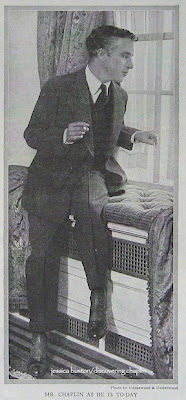At the Ambassador we took a table near the dancing space in the center of the room.
Wealthy sightseers stopped within a few feet of the great man's table. Three women introduced themselves. Charlie, as usual, with the manners of a duke, stood up and bowed politely. When the last lady had gone Charlie exclaimed, under his breath, "darn her!"
"Why is wealth more vulgar than poverty, Charlie?" I asked.
He looked at me earnestly as if trying to frame an answer.
"Because," he answered slowly, "wealth itself is more vulgar. There's simplicity in poverty--simplicity without ostentation."
I liked the answer.
 |
| From Pictorial Review, 1927. Photo by Apeda. |
Time and again beautiful women at neighboring tables or from the dancing-floor smiled their open admiration. He, Charlie, was oblivious of it all. I called his attention to it. His only comment was, “They know I am Charlie Chaplin. If I came in here an unknown, no one would look at me.” Then, his face lighting up, he began in a reminiscent mood:
“There’s more fun meeting someone who doesn’t know who you are. I met a pretty little girl on Broadway one day. She worked at a soda-fountain and I was in having an ice cream soda. I had no necktie on—and my shirt was open at the throat, and I hadn’t shaved in three days—I was very low and didn’t know what to do with myself so I’d strolled into the place and finished my soda just as the girl was goin’ off duty. She’d smiled nice at me before, and I jokingly said:
“Can I walk down the street with you? And she came right back, “Surely."
We walked out of the store together and finally the little girl asked, “Where do you work?”
“Over at Robinson’s in the shoe department—I’m on my vacation now," I told her.
“Gee—you got a good job, ain’t you?” She looked admiringly at me when she said it.
“You bet I have—I’m gettin’ thirty a week the first of October—I came out here from the East an’ fell right into it a year ago.”
“Gosh—you was lucky” said the girl. “My brother didn’t get work for four months after we came here—work’s hard to get here—when you don’t know no one.”
“I’ll say it is,” I told her.
We looked at some hats in a window. “That’s a peach, ” I said, “for six dollars—”
“Gee—it’s a dandy—but they ain’t no hat in the world worth that much—not when you jerk soda for a livin’—I make all my own hats.”
“That so?” I says; “the hat you got on looks nice—did you make it?”
“I sure did.”
Charlie placed a knife and fork in the form of a pyramid. It fell down. He resumed.
“I’ve never seen anyone prettier than that little girl—she had a little doll mouth and great big blue eyes that always seemed to be askin’ questions. We went over in Pershing Square and sat down, I kept my cap low over my eyes so’s no one would notice me—and the little kid talked on just as if she was hungry to tell someone her troubles. “You like it in California?” I asked her.
“Yes—we had so much trouble back in Iowa I was glad to get away.”
“Father owned a big farm there—then everything happened at once,” she shuddered, and I didn’t press matters, but changed the subject.
I made up my mind right then to be her friend. “Let’s go an’ have something to eat,” I suggested. She was willing, and we walked along Fifth Street, and when we came to Boos Brothers’ Cafeteria near Broadway she kind of sidled toward it.
I told her we weren’t going there and that I knew a better place. She says, “Where?” and I says, “The Alexandria.”
She gasped right out and says, “Gee, no—it’s too swell. It’ll cost you a week’s wages for a meal there.” I told her I wanted to celebrate and that one of the waiters roomed where I do—so’s it would be all right. “But you ain’t got no tie on,” she told me. I told her we would sit over in the corner. Finally she went in with me.
We had the finest time, as she soon forgot herself and began to talk to me some more about her life on the farm and her driving to high school every morning.
Then I told her how one time I came near buying a hog ranch in Texas and settling down to raise hogs. I intended to do that one time just before I went into pictures—and I came darn near letting the cat out of the bag—forgetting that I was just a shoe clerk to her, when she says, “It takes money to buy hog ranches—even in Texas.” Then I came down to earth.
We sat there a long time and kept getting chummier and chummier until finally Norma Talmadge came in and came running up to me yelling, “Hello, Charlie!” and the game was up. The little girl looked startled and tried to stammer something when I introduced Norma to her. She excused herself for a minute. —Charlie looked around the gay room wistfully—“and she never came back.”
There was a pause for some minutes. “She never came back to work, and I could never find any trace of her—and that was that.”
After a pause Charlie drummed the table with his fingers, then rising, he said quietly, more to himself that to me, “You never can tell.”
gh! here is that glimmer of the "beautiful problem child" again. allow me to throw my hands up in despair.
ReplyDelete